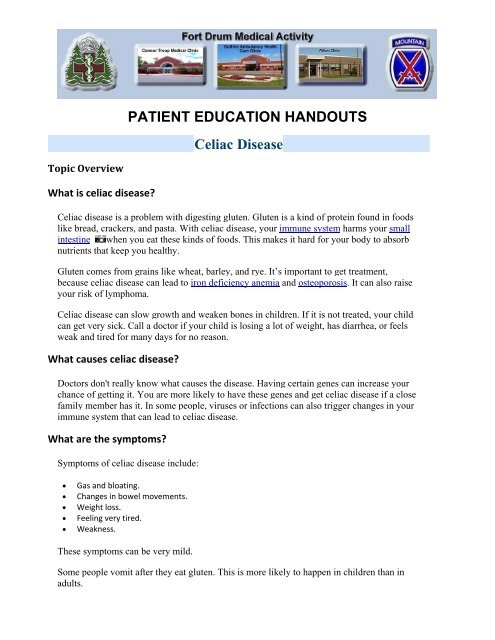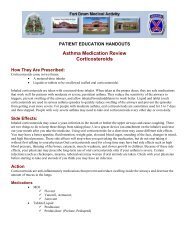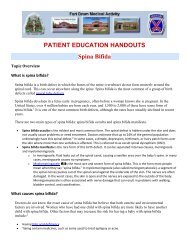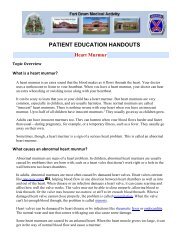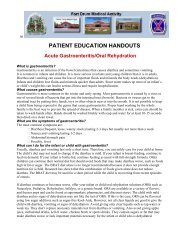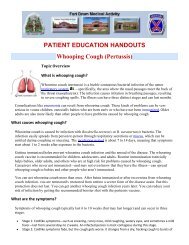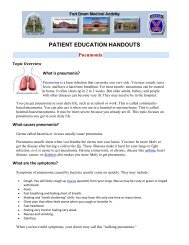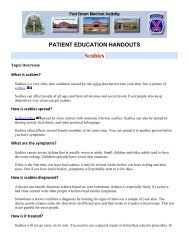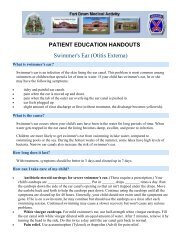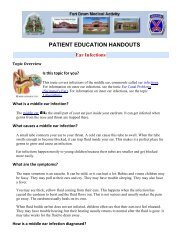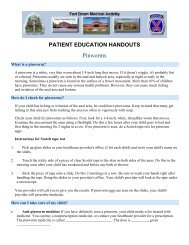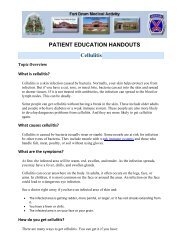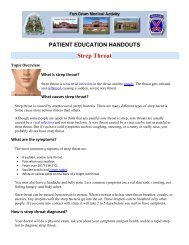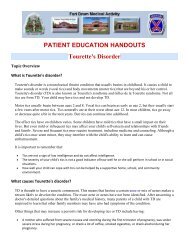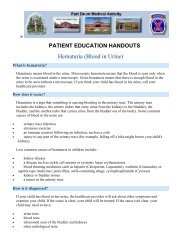PATIENT EDUCATION HANDOUTS Celiac Disease
PATIENT EDUCATION HANDOUTS Celiac Disease
PATIENT EDUCATION HANDOUTS Celiac Disease
You also want an ePaper? Increase the reach of your titles
YUMPU automatically turns print PDFs into web optimized ePapers that Google loves.
<strong>PATIENT</strong> <strong>EDUCATION</strong> <strong>HANDOUTS</strong><br />
<strong>Celiac</strong> <strong>Disease</strong><br />
Topic Overview<br />
What is celiac disease<br />
<strong>Celiac</strong> disease is a problem with digesting gluten. Gluten is a kind of protein found in foods<br />
like bread, crackers, and pasta. With celiac disease, your immune system harms your small<br />
intestine when you eat these kinds of foods. This makes it hard for your body to absorb<br />
nutrients that keep you healthy.<br />
Gluten comes from grains like wheat, barley, and rye. It’s important to get treatment,<br />
because celiac disease can lead to iron deficiency anemia and osteoporosis. It can also raise<br />
your risk of lymphoma.<br />
<strong>Celiac</strong> disease can slow growth and weaken bones in children. If it is not treated, your child<br />
can get very sick. Call a doctor if your child is losing a lot of weight, has diarrhea, or feels<br />
weak and tired for many days for no reason.<br />
What causes celiac disease<br />
Doctors don't really know what causes the disease. Having certain genes can increase your<br />
chance of getting it. You are more likely to have these genes and get celiac disease if a close<br />
family member has it. In some people, viruses or infections can also trigger changes in your<br />
immune system that can lead to celiac disease.<br />
What are the symptoms<br />
Symptoms of celiac disease include:<br />
• Gas and bloating.<br />
• Changes in bowel movements.<br />
• Weight loss.<br />
• Feeling very tired.<br />
• Weakness.<br />
These symptoms can be very mild.<br />
Some people vomit after they eat gluten. This is more likely to happen in children than in<br />
adults.
How is celiac disease diagnosed<br />
Your doctor will ask questions about your symptoms and do a physical exam. You may have<br />
blood tests to see if you have certain antibodies that could mean you have the disease. To<br />
make sure you have celiac disease, you will probably have an endoscopy. In this test, a<br />
doctor uses an endoscope—a thin, lighted tube that bends—to look at the inside of your<br />
small intestine. During the endoscopy, the doctor may take a small sample of tissue to be<br />
tested in a lab. This is called a biopsy.<br />
Often celiac disease is mistaken for another problem such as food intolerance or irritable<br />
bowel syndrome. You may be treated for one of these problems first.<br />
After your celiac disease diagnosis, your doctor may do more tests, such as an X-ray, a stool<br />
test, or a bone density exam. These will help your doctor find out if you have other<br />
problems, such as osteoporosis, that can arise when you have celiac disease.<br />
How is it treated<br />
To get and stay well, you need to avoid all foods that have gluten. Do not eat any foods<br />
made with wheat, rye, or barley. Don't drink any beer or ale.<br />
You can still eat eggs, meat, fish, fruit, and vegetables. Flours and starches made from rice,<br />
corn, buckwheat, potatoes, and soybeans are also okay. Within 2 weeks after starting a<br />
gluten-free eating plan, most people find that their symptoms have improved.<br />
For a short time after your treatment starts, you might also need to stop drinking cow's milk<br />
and foods made with it. Most of the time, but not always, people can have these foods again<br />
after their intestine has healed.<br />
Some foods that are labeled “wheat-free” may still have gluten. Gluten can be in things you<br />
may not expect, like medicine and vitamins. Be sure to read food labels. Those with<br />
“modified food starch” or “hydrolyzed vegetable protein” may contain gluten.<br />
Frequently Asked Questions<br />
Learning about celiac<br />
disease:<br />
Being diagnosed:<br />
Getting treatment:<br />
Ongoing concerns:<br />
• What is celiac disease<br />
• Who get it<br />
• What causes it<br />
• What are the symptoms<br />
• What is the usual course of the disease<br />
• What other conditions have symptoms similar to celiac<br />
disease<br />
• How is celiac disease diagnosed<br />
• What happens during a medical history and physical<br />
examination<br />
• What is the treatment for celiac disease<br />
• When should I call a doctor<br />
• What increases the risk for celiac disease<br />
• Can it be prevented
• What are the complications<br />
Living with celiac disease:<br />
• What kinds of home treatment are used<br />
• What is a gluten‐free diet<br />
• How can I help my teen follow a gluten‐free diet<br />
• How do I make an eating plan for celiac<br />
disease<br />
Author: Amy Fackler, MA<br />
Debby Golonka, MPH<br />
Last Updated: July 6, 2006<br />
Medical Review: Michael J. Sexton, MD ‐ Pediatrics<br />
Jerry S. Trier, MD ‐ Gastroenterology<br />
_________________________________________________________________________________________________<br />
Reviewed 9 June 2008


